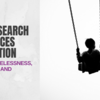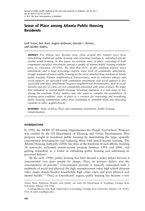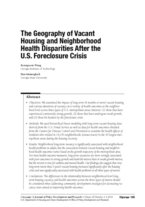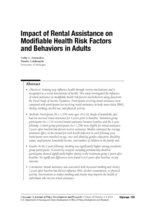0
Research
Community:
Oct 16, 2018
The evidence on how homelessness affects children suggests policymakers should be doing everything possible to prevent homelessness and, when families who do lose their housing, to help them exit homelessness and stabilize in housing quickly. Rapid re-housing (RRH) can help homeless families in crisis.
Authored by: Mary K. Cunningham for The Urban Institute
Topics: Child welfare, Health, Homelessness, Housing, Legislation & Policy, Low-income, Research, Stability
 Shared by Mica O'Brien
Shared by Mica O'Brien
Mica O'Brien posted a
on Nov 5, 2018
Mary K. Cunningham for The Urban Institute
The evidence on how homelessness affects children suggests policymakers should be doing everything possible to prevent homelessness and, when families who do lose their housing, to help them exit homelessness and stabilize in housing quickly.
0
Research
Community:
Nov 5, 2018
Using multiple panels from the US Census Bureau’s Survey of Income and Program Participation, we find that participation in Temporary Assistance for Needy Families, the Supplemental Nutrition Assistance Program (SNAP), or public health insurance reduces the number of hardships low-income families with children experience by 48 percent and reduces the share who experience food insufficiency by 72 percent.
Authored by: Signe-Mary McKernan and Caroline Ratcliffe for The Urban Institute
Topics: Child welfare, Cost effectiveness, Food insecurity, Legislation & Policy, Low-income, Medicaid / Medicare, Metrics, Research, Stability
 Shared by Mica O'Brien
Shared by Mica O'Brien
Mica O'Brien posted a
on Nov 5, 2018
Signe-Mary McKernan and Caroline Ratcliffe for The Urban Institute
Using multiple panels from the US Census Bureau’s Survey of Income and Program Participation, we find that participation in Temporary Assistance for Needy Families, the Supplemental Nutrition Assistance Program (SNAP), or public health insurance reduces the number of hardships low-income families w
0
Policy Brief
Community:
Nov 1, 2018
There are opportunities for federal and state policies to better support postsecondary institutions in serving students who are parents and their families. Policymakers can incentivize partnerships, name students who are parents as special or target populations, and facilitate financial aid processes that address the needs of families. Where possible, policies can also encourage creative and innovative approaches to leveraging existing programs to facilitate access and successful completion for parenting students. These recommendations seek to promote policy changes that address the critical supports students raising children and their families need for successful completion: affordable and quality child care, financial aid, wraparound services, and workforce readiness.
Authored by: Ascend: The Aspen Institute
Topics: Dual-generation, Education, Legislation & Policy, Partnerships, Post-secondary, Research, Workforce development, Youth
 Shared by Mica O'Brien
Shared by Mica O'Brien
Mica O'Brien posted a
on Nov 1, 2018
Ascend: The Aspen Institute
There are opportunities for federal and state policies to better support postsecondary institutions in serving students who are parents and their families.
0
Policy Brief
Community:
Oct 29, 2018
In this Focus on Unaccompanied Youth brief, we review data and information that help us answer the following
questions:
• What is the scale of youth homelessness?
• What do we know about unaccompanied youth who experience homelessness?
• What do we know about patterns of homelessness among unaccompanied youth?
• What do we know about youths’ risks for experiencing homelessness?
• What are the most significant gaps in available data and our current understanding of unaccompanied
youth who experience homelessness?
Authored by: U.S. Interagency Council on Homelessness
Topics: Data sharing, Homelessness, Housing, Low-income, Metrics, Research, Youth
 Shared by Mica O'Brien
Shared by Mica O'Brien
Mica O'Brien posted a
on Nov 1, 2018
U.S. Interagency Council on Homelessness
In this Focus on Unaccompanied Youth brief, we review data and information that help us answer the following
questions:
• What is the scale of youth homelessness?
• What do we know about unaccompanied youth who experience homelessness?
• What do we know about patterns of homelessness among unacc
0
Research
Community:
Aug 28, 2018
Current efforts to end homelessness are largely focused on the immediate housing needs of adults. Yet recent research further demonstrates the importance of addressing childhood, early care, and education in efforts to prevent and end homelessness. This blog post summarizes five new studies. Topics include homelessness in the womb and during infancy; the Adverse Childhood Experiences of homeless adults; the employment of families during and after stays in homeless shelters; and the impact of Rapid Rehousing on the education of children and youth experiencing homelessness.
Authored by: SchoolHouse Connection
Topics: Child welfare, Dual-generation, Early childhood, Education, Health, Homelessness, Housing, Low-income, Pre-natal, Research
 Shared by Mica O'Brien
Shared by Mica O'Brien
Mica O'Brien posted a
on Oct 31, 2018
Current efforts to end homelessness are largely focused on the immediate housing needs of adults. Yet recent research further demonstrates the importance of addressing childhood, early care, and education in efforts to prevent and end homelessness. This blog post summarizes five new studies.
0
Research
Community:
Oct 29, 2018
We examine the implementation of a community health worker (CHW) program in subsidized housing, describe needs identified and priorities set by residents, and summarize participant-reported outcomes.
Authored by: New York University School of Medicine, New York University, Henry Street Settlement, New York University School of Medicine
Topics: East Coast, Health, Housing, Low-income, Partnerships, Place-based, Research
 Shared by Mica O'Brien
Shared by Mica O'Brien
Mica O'Brien posted a
on Oct 29, 2018
New York University School of Medicine, New York University, Henry Street Settlement, New York University School of Medicine
We examine the implementation of a community health worker (CHW) program in subsidized housing, describe needs identified and priorities set by residents, and summarize participant-reported outcomes.
0
Research
Community:
Oct 25, 2018
In contrast to the portrayal of homelessness as affecting people with behavioral health problems or low employment capacity, cycles of homelessness could reflect job shifts that bring a household in or out of poverty. To assess the connections between employment and homelessness, researchers focused on three topics: (1) employment and earnings before, during, and after adults used a homeless shelter; (2) changes in employment and earnings in connection to shelter entry and exit; and (3) employment and earnings differences between adults who are homeless as part of a family versus as individuals.
Authored by: Stephen Metraux, Jamison Fargo, Nicholas Eng, and Dennis Culhane for Cityscape
Topics: Asset building, Homelessness, Housing, Low-income, Research, Stability, Workforce development
 Shared by Mica O'Brien
Shared by Mica O'Brien
Mica O'Brien posted a
on Oct 25, 2018
Stephen Metraux, Jamison Fargo, Nicholas Eng, and Dennis Culhane for Cityscape
In contrast to the portrayal of homelessness as affecting people with behavioral health problems or low employment capacity, cycles of homelessness could reflect job shifts that bring a household in or out of poverty.
0
Policy Brief
Community:
Oct 9, 2018
This brief highlights evidence on nutrition supports for families with young children and proposes a policy-focused research agenda designed to address knowledge gaps in two areas: (1) understanding disparities in participation in nutrition supports and (2) assessing strategies to increase access to nutrition supports and reduce nutrition disparities.
Authored by: Mathematica
Topics: Child welfare, Dual-generation, Early childhood, Food insecurity, Low-income, Nutrition, Research
 Shared by Mica O'Brien
Shared by Mica O'Brien
Mica O'Brien posted a
on Oct 22, 2018
This brief highlights evidence on nutrition supports for families with young children and proposes a policy-focused research agenda designed to address knowledge gaps in two areas: (1) understanding disparities in participation in nutrition supports and (2) assessing strategies to increase access to
0
Policy Brief
Community:
Oct 9, 2018
This brief highlights evidence on income support policies, and associated work requirements, for families with young children and proposes a policy-focused research agenda designed to address knowledge gaps in two areas: (1) understanding disparities in participation in income supports and (2) assessing innovative strategies to reduce disparities in income supports.
Authored by: Mathematica
Topics: Legislation & Policy, Low-income, Research, Workforce development
 Shared by Mica O'Brien
Shared by Mica O'Brien
Mica O'Brien posted a
on Oct 22, 2018
This brief highlights evidence on income support policies, and associated work requirements, for families with young children and proposes a policy-focused research agenda designed to address knowledge gaps in two areas: (1) understanding disparities in participation in income supports and (2) asses
0
Policy Brief
Community:
Oct 9, 2018
This brief highlights evidence about early care and education (ECE) access and presents a policy-focused research agenda designed to fill knowledge gaps in three areas: (1) documenting disparities in access to and participation in ECE, (2) identifying and assessing innovations to reduce disparities, and (3) identifying and testing strategies to scale up effective ECE programs.
Authored by: Mathematica
Topics: Early childhood, Education, Legislation & Policy, Low-income, Research, School-readiness
 Shared by Mica O'Brien
Shared by Mica O'Brien
Mica O'Brien posted a
on Oct 22, 2018
This brief highlights evidence about early care and education (ECE) access and presents a policy-focused research agenda designed to fill knowledge gaps in three areas: (1) documenting disparities in access to and participation in ECE, (2) identifying and assessing innovations to reduce disparities,
0
Policy Brief
Community:
Oct 9, 2018
Research shows that the earliest years of life are a critical period of human development. Young children’s earliest relationships and experiences have a strong influence on brain development and future health and well-being. Young children’s foundational relationships and experiences occur in the context of families and communities. Yet, low-income families—especially families of color and rural families—often do not have access to the basic necessities and resources to foster the nurturing experiences and stimulating environments that young children need to thrive. What is needed are policies that support low-income families to provide stimulating and nurturing environments to promote children’s healthy physical, socialemotional, and cognitive development and their future success in school and life.
Authored by: Mathematica
Topics: Child welfare, Dual-generation, Early childhood, Low-income, Research
 Shared by Mica O'Brien
Shared by Mica O'Brien
Mica O'Brien posted a
on Oct 22, 2018
Research shows that the earliest years of life are a critical period of human development. Young children’s earliest relationships and experiences have a strong influence on brain development and future health and well-being.
0
Research
Community:
Oct 3, 2018
Two new research briefs use recent data from the Head Start Family and Child Experiences Survey (FACES 2014) to explore characteristics of children enrolled in Head Start and the leaders and teachers who guide the programs.
Authored by: Mathematica
Topics: Child welfare, Early childhood, Low-income, Research, School-readiness
 Shared by Mica O'Brien
Shared by Mica O'Brien
Mica O'Brien posted a
on Oct 22, 2018
Two new research briefs use recent data from the Head Start Family and Child Experiences Survey (FACES 2014) to explore characteristics of children enrolled in Head Start and the leaders and teachers who guide the programs.
0
Research
Community:
Oct 11, 2018
Public preschool programs are one way state and local governments can support immigrant children and families. We estimate that opening preschool to all children who speak languages other than English at home would lead to 3,200 new low-income preschoolers (from those already eligible) and up to 92,000 additional enrollees (from those newly eligible).
Authored by: Erica Greenberg, Victoria Rosenboom, Hamutal Bernstein for Urban Institute
Topics: Early childhood, Education, Immigrants, Low-income, Metrics, Research
 Shared by Mica O'Brien
Shared by Mica O'Brien
Mica O'Brien posted a
on Oct 11, 2018
Erica Greenberg, Victoria Rosenboom, Hamutal Bernstein for Urban Institute
Public preschool programs are one way state and local governments can support immigrant children and families.
0
Research
Community:
May 1, 2018
The third in a series of Research-to-Impact briefs by Chapin Hall at the University of Chicago on understanding and addressing youth homelessness.
Authored by: Chapin Hall and Voices of Youth Count
Topics: Early childhood, Family engagement, Home visiting, Low-income, Partnerships, Pre-natal, Research, Youth
 Shared by Mica O'Brien
Shared by Mica O'Brien
Mica O'Brien posted a
on Oct 10, 2018
Chapin Hall and Voices of Youth Count
The third in a series of Research-to-Impact briefs by Chapin Hall at the University of Chicago on understanding and addressing youth homelessness.
0
Research
Community:
Oct 1, 2018
Although the rental assistance programs varied, key themes emerged, including (1) most programs, recognizing the impact of housing stability on health outcomes, targeted populations served by state or local health and human services programs; (2) most programs served a growing number of households over time; (3) funding generally increased over time and most of it came from general revenue; and (4) programs involved collaboration between the housing and health and human services agencies to ensure clients’ needs were comprehensively met.
Authored by: Anna Bailey, Peggy Bailey, and Douglas Rice for the Center on Budget and Policy Priorities
Topics: Funding, Health, Housing, Legislation & Policy, Low-income, Partnerships, Place-based, Research, Stability
 Shared by Mica O'Brien
Shared by Mica O'Brien
Mica O'Brien posted a
on Oct 9, 2018
Anna Bailey, Peggy Bailey, and Douglas Rice for the Center on Budget and Policy Priorities
Although the rental assistance programs varied, key themes emerged, including (1) most programs, recognizing the impact of housing stability on health outcomes, targeted populations served by state or local health and human services programs; (2) most programs served a growing number of households o
0
Research
Community:
Oct 3, 2018
Using administrative data from Massachusetts, this study analyzes the health care use and Medicaid expenditures of families who experienced one or more homeless episodes between 2008 and 2015 to investigate how health care use is related to emergency housing experiences.
Authored by: Urban Institute
Topics: Asthma, Child welfare, Depression, Health, Homelessness, Housing, Low-income, Medicaid / Medicare, Metrics, Pre-natal, Research
 Shared by Mica O'Brien
Shared by Mica O'Brien
Mica O'Brien posted a
on Oct 4, 2018
Using administrative data from Massachusetts, this study analyzes the health care use and Medicaid expenditures of families who experienced one or more homeless episodes between 2008 and 2015 to investigate how health care use is related to emergency housing experiences.
0
Research
Community:
Oct 4, 2018
Housing providers and counselors in urban, suburban, and rural areas can help refugees and resettlement agencies navigate challenging rental markets, understand the evidence about how housing and neighborhoods matter, and prepare for long-term success as a renter or owner.
Authored by: Brianne Casey, Kimberly Burrowes, and Maya Brennan for Urban Institute
Topics: Community development, Housing, Immigrants, Research, Stability
 Shared by Mica O'Brien
Shared by Mica O'Brien
Mica O'Brien posted a
on Oct 4, 2018
Brianne Casey, Kimberly Burrowes, and Maya Brennan for Urban Institute
Housing providers and counselors in urban, suburban, and rural areas can help refugees and resettlement agencies navigate challenging rental markets, understand the evidence about how housing and neighborhoods matter, and prepare for long-term success as a renter or owner.
1
Research
Community:
Sep 19, 2018
About 20 percent of adults in sheltered homeless families have a disability, compared with 9 percent of all US adults, yet few studies have addressed the intersection of disability and housing instability. A recent study explored the relationship between disabilities and Supplemental Security Income (SSI)/Social Security Disability Insurance (SSDI) income that homeless families reported when they entered emergency shelters, as well as later outcomes, such as housing stability, self-sufficiency, and food insecurity. It also examined how housing interventions affect SSI/SSDI income receipt.
Authored by: Urban Institute
Topics: Disabilities, Homelessness, Housing, Low-income, Research, Stability
 Shared by Mica O'Brien
Shared by Mica O'Brien
Mica O'Brien posted a
on Sep 20, 2018
About 20 percent of adults in sheltered homeless families have a disability, compared with 9 percent of all US adults, yet few studies have addressed the intersection of disability and housing instability.
0
Research
Community:
Sep 19, 2018
Many social issues stem from a history of unstable, unaffordable, and poor-quality housing. Research shows that housing is the first rung on the ladder to economic opportunity for individuals and that a person’s access to opportunity is intrinsically linked with that of the community at large. As the gap between rents and incomes widens, it is critical that professionals in fields outside housing—including health, education, and economic development, among others—understand its central importance.
Authored by: Veronica Gaitan for Urban Institute
Topics: Community development, Education, Health, Housing, Low-income, Metrics, Partnerships, Research
 Shared by Mica O'Brien
Shared by Mica O'Brien
Mica O'Brien posted a
on Sep 20, 2018
Veronica Gaitan for Urban Institute
Many social issues stem from a history of unstable, unaffordable, and poor-quality housing. Research shows that housing is the first rung on the ladder to economic opportunity for individuals and that a person’s access to opportunity is intrinsically linked with that of the community at large.
0
Research
Community:
Jul 1, 2018
This report compares the profile of the schools accessible to HUD-assisted and LIHTC households in 2016 to the profile of those accessible to other similar households within the same state or metropolitan area. In brief, we find that families receiving all four major types of federal housing assistance lived near lower performing and higher poverty schools than other poor families with children as well as other renters with children.
Authored by: Poverty and Race Research Action Council, NYU Furman Center, and UMass Boston
Topics: Education, Housing, Low-income, Mobility, Racial inequalities, Research, Youth
 Shared by Mica O'Brien
Shared by Mica O'Brien
Mica O'Brien posted a
on Sep 18, 2018
Poverty and Race Research Action Council, NYU Furman Center, and UMass Boston
This report compares the profile of the schools accessible to HUD-assisted and LIHTC households in 2016 to the profile of those accessible to other similar households within the same state or metropolitan area.
0
Research
Community:
Sep 17, 2018
The study finds three out of five adults across the U.S. had at least one adverse experience in their childhood, such as divorce, a parent's death, physical or emotional abuse, or a family member's incarceration or substance abuse problem. A quarter of adults have at least three such experiences in childhood, which – according to other research — increases their risk for most common chronic diseases, from heart disease and cancer to depression and substance abuse.
Authored by: Tara Haelle for NPR
Topics: Child welfare, Depression, Early childhood, Low-income, Mental health, Racial inequalities, Research
 Shared by Mica O'Brien
Shared by Mica O'Brien
Mica O'Brien posted a
on Sep 18, 2018
The study finds three out of five adults across the U.S. had at least one adverse experience in their childhood, such as divorce, a parent's death, physical or emotional abuse, or a family member's incarceration or substance abuse problem.
0
Research
Community:
Aug 9, 2018
For almost two decades now, cities around the country have been demolishing traditional public housing and relocating residents to subsidized private market rental housing. In this paper, we examine sense of place, consisting of both community and place attachment, among a sample of Atlanta public housing residents prior to relocation.
Authored by:
Topics: Asset building, Housing, Legislation & Policy, Low-income, Mental health, Mobility, Research, South, Stability
 Shared by Housing Is
Shared by Housing Is
Housing Is posted a
on Aug 9, 2018
For almost two decades now, cities around the country have been demolishing traditional public housing and relocating residents to subsidized private market rental housing.
1
Research
Community:
Aug 1, 2018
We examined the impact of long-term (6 months or more) vacant housing and various durations of vacancy on a variety of health outcomes at the neighborhood level across three types of U.S. metropolitan areas (metros): (1) those that have experienced consistently strong growth, (2) those that have undergone weak growth, and (3) those hit hardest by the foreclosure crisis
Authored by:
Topics: Asset building, Asthma, Community development, Health, Housing, Low-income, Mental health, Metrics, Research, Safety, Transportation
 Shared by Housing Is
Shared by Housing Is
Housing Is posted a
on Aug 1, 2018
We examined the impact of long-term (6 months or more) vacant housing and various durations of vacancy on a variety of health outcomes at the neighborhood level across three types of U.S.
0
Research
Community:
Aug 1, 2018
Housing may influence health through various mechanisms and is
recognized as a social determinant of health. This study investigated the influence of rental assistance on modifiable health risk factors and behaviors using data from the Panel Study of Income Dynamics. Participants receiving rental assistance were compared with participants not receiving rental assistance on body mass index (BMI), obesity, smoking, alcohol use, and physical activity
Authored by:
Topics: Exercise, Health, Housing, Low-income, Metrics, Nutrition, Obesity, Partnerships, Racial inequalities, Research, Smoke-free, Substance abuse
 Shared by Housing Is
Shared by Housing Is
Housing Is posted a
on Aug 1, 2018
Housing may influence health through various mechanisms and is
recognized as a social determinant of health. This study investigated the influence of rental assistance on modifiable health risk factors and behaviors using data from the Panel Study of Income Dynamics.
0
Research
Community:
Aug 1, 2018
Homelessness among children is correlated with developmental delays, fair or poor health, and high healthcare utilization. Associations of homelessness specifically among infants younger than 12 months, however, are unknown. This study evaluates homelessness during infancy as a risk for adverse infant and maternal health and hardship.
Authored by:
Topics: Child welfare, Depression, Disabilities, Dual-generation, Early childhood, Education, Family engagement, Food insecurity, Grade-level proficiency, Health, Homelessness, Housing, Low-income, Metrics, Partnerships, Pre-natal, Research, School-readiness, Youth
 Shared by Housing Is
Shared by Housing Is
Housing Is posted a
on Aug 1, 2018
Homelessness among children is correlated with developmental delays, fair or poor health, and high healthcare utilization. Associations of homelessness specifically among infants younger than 12 months, however, are unknown.




 Shared by Housing Is
on Aug 9, 2018
Shared by Housing Is
on Aug 9, 2018
 Shared by Housing Is
on Aug 1, 2018
Shared by Housing Is
on Aug 1, 2018
 Shared by Housing Is
on Aug 1, 2018
Shared by Housing Is
on Aug 1, 2018
 Shared by Housing Is
on Aug 1, 2018
Shared by Housing Is
on Aug 1, 2018







